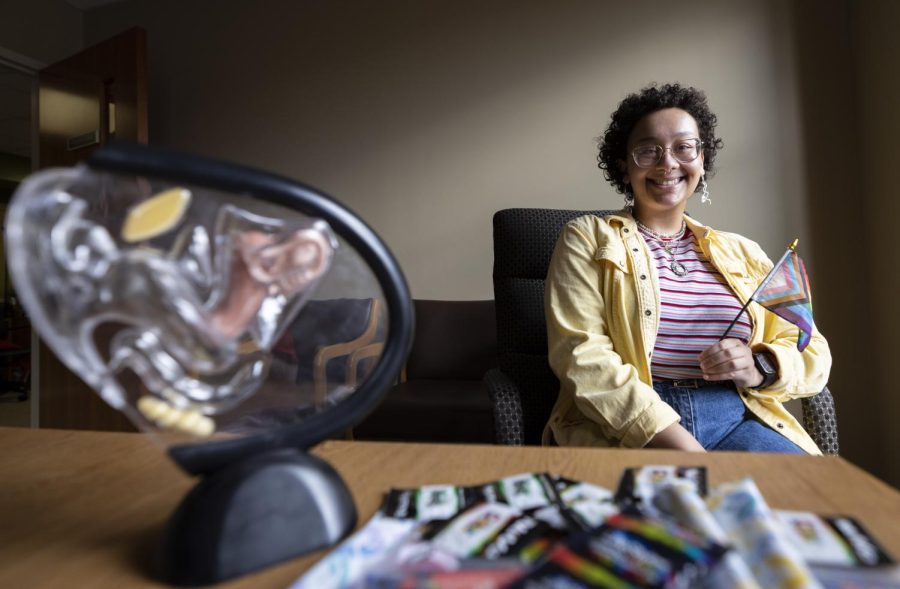‘This is the best place to start’: The stigma surrounding sexual health
Arielle Railley, a senior health science major poses for a portrait in an office at the Health Education and Promotion office on Wednesday, Feb. 22, 2023.
March 20, 2023
As discussions surrounding sex become less taboo, the topic of sexual health and issues that affect it remain cloaked in privacy.
According to the World Health Organization, sexual health is the well-being achieved from access to sexual health care, comprehensive sexual education and knowledge of risks and vulnerability during unsafe sex.
If someone experiences a lack in sexual health, talking about problems they face – whether in physical, mental or educational health – can be difficult due to the stigma surrounding sexual health, dysfunctions, disorders and diseases.
Airelle Railley, a senior health sciences major, has always advocated for and supported those who may deal with sexual health issues and the stigma that comes alongside it.
As a student worker at WKU Health Education and Promotion, their advocacy has only been extended as they meet those that need resources and support that HEP offers.
“Working at HEP has heightened my support, as I found myself meeting all sorts of life that walks through our office, thus I will continue to support [them] no questions or comments asked,” Railley said.
Sexual health includes the idea of sexual dysfunctions and disorders, defined as problems that prevent one from experiencing satisfaction during sexual activities. These could include desire, arousal, orgasm or pain disorders occurring within the stages of sex.
Railley explained these types of physical hindrances that may affect how people have sex. Those who experience physical deficiencies, non-arousal or pain problems could interfere with sexual activity and how one can “ultimately enjoy sex,” Railley said. They also described the possibility of psychological hindrances that affect sex.
“For example, if someone was to experience hormone imbalances, that plays out in the physical aspect,” Railley said. “With mental [issues], those psychological hindrances, like depression, anxiety, PTSD, and even body dysmorphia can definitely not only affect your experience, but if you choose to have a partner, their experience can be affected as well.”
At HEP, individuals from WKU in need can find sexual health resources and opportunities to learn more about their own sexual health. Railley spoke on their experience in working in an open but professional environment concerning sexual health care.
“You want to keep that professional distance, but at the same time, allow them to know that they can release that baggage of worry when they come to HEP and let them know that their health business is their personal business,” Railley said.
When it comes to the stigma surrounding the discussion of sexual dysfunction, Railley said the conversation begins with accepting whatever sexual health issues you may face.
“I feel like, on a personal level, a lot of it has to do with pretty much accepting yourself,” Railley said.
Railley said this act is necessary to find the comfortability and confidence to talk about sexual health issues with your partner, as well as stand your ground if said partner rejects this conversation.
“If they [a partner] can’t accept you like that, then honestly, why would you share such an intimate moment with somebody who pretty much does not want to know you through and through,” Railley said.
On a college campus, the topic of sexual health is often coupled with the idea of “hookup culture,” or uncommitted sexual encounters. While this culture has created a more open environment for sexual expression, it has also made standards for what hookups should be – specifically in the level of involvement of hookup partners in one another’s personal lives.
Railley said with hookup culture specifically, opening the door for conversations around sexual health is difficult. This could be due to the desire not to “overshare” with uncommitted sexual partners.
“In terms of hookup culture, I do feel like a lot of times people don’t talk about anything at all,” Railley said. “Thus, we get things that happen such as STIs and unplanned pregnancies […] When it comes to hookup culture in general, there’s a lot of ignored elephants that are in the room.”
Despite this, Railley believes sharing details of your sexual health that could affect your sexual partners is part of your “moral obligation” to participate in hookup culture and sex in general.
“I feel like especially with our generation, we’re a lot more accepting and open to what’s going on in terms of our health, because at the end of the day, it’s all about your morals,” Railley said. “It’s your moral obligation to let your partner know what’s going on.”
A sexual health issue that has faced historic amounts of stigma and misunderstanding is human immunodeficiency virus, or HIV.
HIV is a disease transmitted most commonly through anal or vaginal sex or by sharing needles and syringes. It attacks the body’s immune system, and without treatment to manage the disease, it could progress to become acquired immunodeficiency syndrome, or AIDS.
Charlie Rose is an advanced practice registered nurse at Matthew 25 AIDS Services, Inc., an HIV/AIDS clinic with locations in Kentucky and Indiana.
Rose said the clinic provides services to patients with HIV and provides them with treatment regimens that best suit their personal needs.
“We’re going to go through the steps, I’m going to find a medication regimen to treat them with and it’s an ART [antiretroviral therapy] regimen,” Rose said. “I aim for just the standard one pill instead, like back in the day where there were multiple medications.”
Rose stressed that Matthew 25 isn’t solely focused on treatment of HIV, but in order to treat the virus, other health conditions must be managed and prevented. She stated part of the care she provides is “definitely just treating the person as a whole.”
“HIV is the biggest component obviously, but we just want to make sure our other bases are covered, because if you don’t know if, say you have some kind of respiratory disease or diabetes, if you don’t have that under control, how are you going to manage your HIV,” Rose said.
For those that have HIV or other sexually transmitted diseases, stigma, stereotyping and misunderstanding of the diseases could push them into silence, as misconceptions about HIV transmission are still prevalent.
Other than the physical health aspect of an HIV diagnosis that could affect one’s sex life, misconceptions about HIV transmission could keep those with the virus from even approaching having sex. Rose said worries surrounding transmission, even in patients undetectable and on medication, could limit one’s confidence in having sex.
Rose also said knowing your HIV status is crucial if you are participating in activities with an HIV risk, especially with the prevalence of hookup culture.
“All it takes is one person if they’re doing these hookups, and they actually have HIV and they’re not aware of it,” Rose said. “Then there’s a transmission right there, and it just keeps on going.”
Matthew 25 offers free moving HIV testing locations and also offers free HIV testing at its clinic location. Rose said the moving HIV testing locations, including set ups at bars and at WKU, help individuals feel more comfortable and confident in being tested for the virus.
“You might feel more comfortable if you’re surrounded by people that are like you,” Rose said. “They’re willing to just share information there. It’s not like a pressure thing, but [they will] share information with you and then leave information that gives you resources you can get back in contact with.”
According to the Matthew 25 website, the four pillars of HIV prevention are abstinence, regular testing, condom use and use of pre-exposure prophylaxis (PrEP), an HIV preventative.
“There’s more to it because you can just have so many long term health effects,” Rose said.
Rose also said Matthew 25 has recently been able to offer PrEP, which is a valuable tool when preventing HIV. For those that may be at risk for the virus, Rose said the usage of PrEP is a prominent step, due to the long-term and untreatable nature of HIV.
“It’s heartbreaking for someone to come in, trying to do the right thing, and then find out that you can’t, this is not reversible, it’s life changing, this is forever,” Rose said.
Physical hindrances and sexually transmitted diseases are not the only health issues that could affect someone’s sex life.
For Yulia Mishchuk, a sophomore clinical psychology major, mental health issues have affected the way she has sex.
Mental health conditions such as depression and anxiety can cause sexual dysfunction, whether that be through low arousal, low energy levels or low self esteem. Many antidepressant medications used to treat these disorders also make it difficult to receive sexual satisfaction.
Mishchuk’s PTSD has caused her to have a few sexual experiences “where sex felt like abuse to my brain.”
“Sometimes, when sex is not pleasurable, it can trigger a feeling of like, my brain thinks that I’m back as a kid being abused, because it’s a repeated motion or whatever,” Mishchuk said. “And you just shut down or you just get extremely triggered, and it’s either bawling your eyes out or wanting to curl up in a ball or something.”
Mishchuk explained mental health issues that affect how you have sex can be difficult to explain to a partner. She also said she believes the biggest issue when it comes to sex and triggering scenarios is the presence of porn and if a sexual partner has a porn addiction.
“Sometimes it’s not immediately obvious, but when the person is interested in using all these different instruments or a ball gag or handcuffs […] the person wants to be so kinky and freaky or whatever,” Mishchuk said. “And you’re just like, am I not enough? Just me and my naked body. Is that not enough?”
Mishchuk said there is not a space to talk about how mental and physical health can affect your sex life. She said “there’s really not that much of a conversation happening about it” and reflected on the low amount of times she has spoken to friends about mental illness and sex issues.
Mishchuk also discussed the stigma surrounding the handing out of sex products, as sometimes students or individuals feel judged for taking free sexual health products. She wishes comprehensive sex education was more widespread, but appreciates the ease of starting conversations about sexual health on a college campus.
“Especially being on a college campus, it’s so much easier for us to just do whatever we want and start initiatives and get organizations going to spread the word,” Mishchuk said. “I think this is the best place to start.”
Content editor Alexandria Anderson can be reached at alexandria.anderson337@topper.wku.edu.















